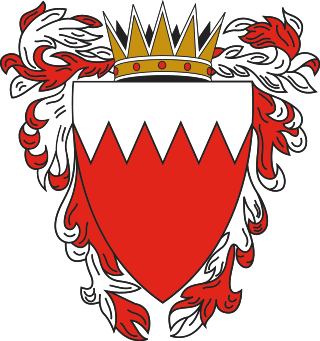
Politics of Bahrain has since 2002 taken place in a framework of a constitutional monarchy where the government is appointed by the King of Bahrain, King Hamad bin Isa Al Khalifa. The head of the government since 2020 is Crown Prince Salman bin Hamad Al Khalifa, who became Prime Minister following the death of Khalifa bin Salman Al Khalifa, and who also serves as Deputy Commander of the Bahrain Defence Force. The parliament is a bicameral legislature, with the Council of Representatives elected by universal suffrage, and the Consultative Council appointed directly by the king.

The National Democratic Labour Action Society – Wa'ad is Bahrain's largest leftist political party.

Al-Wefaq National Islamic Society, sometimes shortened to simply Al-Wefaq, was a Shi'a Bahraini political party, that operates clandestinely after being ordered by the highest court in Bahrain to be dissolved and liquidated. Although from 2006 to 2011 it was by far the single largest party in the Bahraini legislature, with 18 representatives in the 40-member Bahraini parliament, it was often outvoted by coalition blocs of opposition Sunni parties and independent MPs reflecting gerrymandering of electoral districts. On 27 February 2011, the 18 Al-Wefaq members of parliament submitted letters of resignation to protest regime violence against pro-reform Bahraini protestors.

Bahrain has had two constitutions in its modern history. The first one was promulgated in 1973, and the second one in 2002.

Women face widespread discrimination within Bahraini society and the country's political institutions. Women's rights have been a cornerstone of the political reforms initiated by King Hamad. The extension of equal political rights has been accompanied by a conscious drive to promote women to positions of authority within government. However, women in Bahrain continue to face gender inequality in many areas of life.

The Bahrain Freedom Movement is a London-based Bahraini opposition group which has its headquarters in a north London mosque. Its main medium is the Voice of Bahrain website which was blocked for several years by Batelco, Bahrain's sole Internet service provider, on orders from the Ministry of Information.

The Council of Representatives, sometimes translated as the "Chamber of Deputies", is the name given to the lower house of the Bahraini National Assembly, the national legislative body of Bahrain.

The National Justice Movement, also known as the al-Adala Society, is a secular and Arab nationalist political party in Bahrain.
Munira Fakhro is a Bahraini academic and was a candidate in Bahrain's 2006 general election for Wa'ad, the country's largest leftist political party.

General elections were held in Bahrain in November and December 2006 to elect the forty members of the Council of Representatives. The first round of voting was held on 25 November, with a second round on 2 December 2006.

Bahrain's record on human rights has been described by Human Rights Watch as "dismal", and having "deteriorated sharply in the latter half of 2010". Their subsequent report in 2020 noted that the human rights situation in the country had not improved.
In the 2000s in Bahrain the government instituted political reforms and relaxed economic controls.

The following outline is provided as an overview of and topical guide to Bahrain:

The 2011Bahraini uprising was a series of anti-government protests in Bahrain led by the mainly Shia and some Sunni Bahraini opposition from 2011 until 2014. The protests were inspired by the unrest of the 2011 Arab Spring and protests in Tunisia and Egypt and escalated to daily clashes after the Bahraini government repressed the revolt with the support of the Gulf Cooperation Council and Peninsula Shield Force. The Bahraini protests were a series of demonstrations, amounting to a sustained campaign of non-violent civil disobedience and some violent resistance in the Persian Gulf country of Bahrain. As part of the revolutionary wave of protests in the Middle East and North Africa following the self-immolation of Mohamed Bouazizi in Tunisia, the Bahraini protests were initially aimed at achieving greater political freedom and equality for the 45% Shia population.

Grand Ayatollah Sheikh Isa Ahmed Qassim is Bahrain's leading Shia cleric and a politician. He is the spiritual leader of Al Wefaq, Bahrain's biggest opposition society. He is the founder and leader of the Islamic Enlightenment Institution.
Abdulrahman al-Nuaimi was a Bahraini politician and opposition leader. Al-Nuaimi, who spent more than thirty years in self-imposed exile from Bahrain, founded some of the country's most important political opposition groups.

General elections were held in Bahrain in November 2014 to elect the forty members of the Council of Representatives. The first round of voting took place on 22 November, with a second round on 29 November in the 34 constituencies in which no candidate received a majority.

General elections were held in Bahrain on 12 November 2022 to elect the 40 members of the Council of Representatives, with a second round in some constituencies on 19 November.

The al-Mukhtar Brigades, also called Saraya al-Makhtar or Bahraini Islamic Resistance, is a Bahraini Shia insurgent movement that has taken part in several attacks against government targets. It is classified as a terrorist organization by multiple countries, including the United States and United Kingdom. The United States and Bahrain have both accused the Islamic Revolutionary Guard Corps (IRGC) of backing the organization. It is one of the main opposition movements in Bahrain to take up arms and is one of the rebel factions of the insurgency in Bahrain, the main other being the al-Ashtar Brigades.











